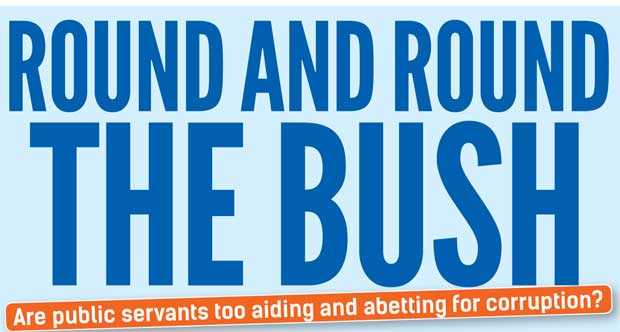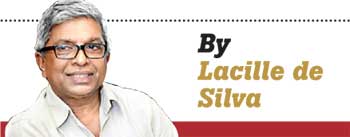Reply To:
Name - Reply Comment
Last Updated : 2024-04-26 08:21:00


ran Wickremaratne, Deputy Minister of State Enterprise Development, speaking at a seminar on “Financial impact of the COPE Report” held at the OPA auditorium, organised by Women for Good Governance, had stated that the loss from inefficiency and waste exceeds far beyond the losses in corruption in the state sector and that there is institutional failure due to politicization.
Minister had rightly diagnosed the issues hampering the progress of the public sector and had said that Secretaries to ministries being Chief Accounting Officers are also responsible for the failure to take suitable steps for improvement. He had also opined that there is no “political will” to make any progress in this particular area. Let me add “good governance” is a farce unless public sector is totally reformed.
Don’t you think that the tax payers’ monies have been entirely wasted to-date, because our elected representatives and the responsible public officials have done nothing at all to improve on the recommendations by the Youth Commission since 1990s?
We have also public officers, who have flawed by grave procedural booboos, having exceeded their jurisdiction and acted maliciously or corruptly for personal gain. In the Youth Commission report it is mentioned that: “The politicisation of appointments is a central aspect of the representations made before the Commission.
We would emphasise that there are certain functions and services in public life which transcend political differences and short term interests of political parties. Appointments to public service is indisputably one such area.
The representations made before us suggest an alarming degree of dissatisfaction in this sphere, and we have considered practical avenues for improving the situation”.
The Commissioners had further reiterated that: “The 1972 Constitution removed the power of appointment vested in the Public Service Commission and brought the responsibility for such appointment within the purview of Cabinet of Ministers, thus triggering, with far reaching repercussions, the process of politicisation.
The Commission is strongly of the view that the reversal of the pernicious process is now an urgent  necessity and that the Public Service Commission, together with other similar Commissions, should be given full autonomy to work out their internal systems of regulation with regard to appointment, promotion, transfer, disciplinary control, and dismissal, and appeals with regard to the matters. It should be considered part of their legitimate function to conceive of and to implement appropriate and effective procedures to consult and collaborate with political authorities.
necessity and that the Public Service Commission, together with other similar Commissions, should be given full autonomy to work out their internal systems of regulation with regard to appointment, promotion, transfer, disciplinary control, and dismissal, and appeals with regard to the matters. It should be considered part of their legitimate function to conceive of and to implement appropriate and effective procedures to consult and collaborate with political authorities.
In the case of quasi-judicial Commissions such as Human Rights Commission, the Press Council, and the Office of the Languages Commission, they should be invested with not only with policy-making powers but also with powers of investigation and inquiry characterised by sufficient flexibility to enable their work to be done efficiently and speedily”.
The Commissioners had also stated that due to extreme politicisation, appointing independent, respected and suitable people to senior positions would help to win the confidence of the people, which would essentially be a point of departure in order for the restoration of public confidence, which should undoubtedly be a vital segment of administrative improvement for the benefit of the people and the country.
Questions regarding laws delays, the nature and structure of the legal profession, expenses of litigation are also other issues youth had complained before the Youth Commission nearly three decades ago.
There had also been representations made to the Commission, about the erosion of public confidence, the standards and the quality of service, whether they be political institutions, community oriented institutions, or intermediary associations such as trade unions and had observed that they had failed to respond to the aspirations of the people.
Report goes on to say that “Sri Lankan society seems at present to be in the throes of a traumatic crisis characterised by relegation of established values and institutions, while the superseding attitudes have yet to gain the confidence of the young”.
Let me quote what GMOA spokesman had stated last week that they were compelled to launch a token strike in objection to the registration of SAITM and that the government will therefore have to bear the total responsibility of the innocent patients who had been badly affected due to the token strike. Could this position be accepted? Aren’t they there to look after patients when and where they are needed? Shouldn’t they be hands-on activists for their patients?
It must also be understood that the GMOA has the right to call up a STRIKE may I say subject to fulfilling obligations and responsibilities towards the general public who need their valuable service in a democratic state while guaranteeing the protection of public order, security, natural environment, health or public morals or the freedoms and rights of persons and citizens. Aren’t the GMOA members performing in other words “essential public services”? It is our experience that the public has been greatly inconvenienced again and again due to numerous strike action by the GMOA in the past.
Shouldn’t we now campaign for the protection of rights of patients who have to suffer due to lack of medicines, indiscriminate strike actions etc. We must therefore urge GMOA that they should also not hold the countrymen to ransom to win their rights such as admitting their children to leading schools. It is highly unethical, immoral and cannot be justified what GMOA had said about their rights and privileges. Being professionals, shouldn’t they also set higher standards for the betterment of the countrymen because they too are products of free education.
We want our doctors to have a balanced life while caring the needs of the society they live in because they have an incredible responsibility towards the patients.
“Primum non nocere” is a Latin phrase which means “First, do no harm”. Shouldn’t it be the foundation on which medical profession is based.
They should not repeat what Dr. Josef Mengele had done as a Medical Officer at the Nazi Concentration Camp in Germany during the Second World War. Mengele had earned the nickname “Angel of Death”. Mengele had been well known for harsher, inhuman and wickedly solutions. He had once ordered seven hundred and fifty women to be gassed and killed in a dormitory because of an outbreak of head lice.
GMOA should refrain from committing acts similar to crimes against humanity by resorting to heartless strikes? Don’t they have a responsibility to create liberal, competitive and humane conditions in the medical profession and in the medical service?
Shouldn’t they as public officers guarantee the achievement of labour peace at all times throughout the country? The poor patients, who were angry had even cursed the Medical Officers country-wide. They claimed GMOA’s decision had deprived the public from obtaining their essential medical services. Shouldn’t the GMOA consider that they have been appropriately skilled by the tax payers’ money to render such services with speed at the lowest cost.
Don’t they have a bigger role to play to uplift the health sector? Aren’t they blaming politicians for the present mess in the public sector? If so, are they also aiding and abetting to make matters even worse?
There had been representations before the Commission against the judiciary too.
“The youth who came before us seemed to have developed a profound cynicism about the legal process…In addition, there was a profound sense that the law’s delays, the nature and structure of the legal profession, and the expense of litigation were such that justice would either be delayed, or never rendered or not be accessible”.
The youth had complained that the legal process be speeded up. Youth before the Commission had also expressed scepticism about the role of politicians and that there was no “democracy” in the country. Commissioners had said “disenchantment … across the national spectrum is the precursor of a dangerous political trend”. Commission has therefore gone to the extent to state:
“The purpose of the recommendation is to rectify an imbalance in the system and to give a voice to a larger number of voters who strongly feel that their interests are not adequately articulated…We are convinced that there is need for drastic measures to ensure youth representation in our political system”. It is however commendable that the present government has taken meaningful steps to introduce the 19th Amendment to the Constitution to re-establish independent Commissions. It must also be mentioned what the Leader of the Opposition, R. Sampanthan had said in Parliament while taking part in the debate relating to the Right to information Bill “This Bill should have been enacted in Parliament a long time ago.
RTI law has been ratified in other countries because it is a very important piece of legislation decades ago. The Right to Information strengthens Fundamental Rights. It strengthens democracy and consequently it strengthens the citizens”.
Sri Lankan youth no doubt even now believe that the country could improve if the rulers stop waste, corruption and depending on political verve, rhetoric and noise, but on honest, concerted and dedicated effort to get to grips with the causes underlying the present malaise and adopt appropriate strategies. It is no doubt very much depend on the direction and the example that the leaders provide and the confidence the people have in their leaders. Despite most of these problems, there is a sense of pride that ours is a good country to live if these deficiencies are corrected. Shouldn’t the elected representatives therefore extend their fullest cooperation to the leadership to take the country forward without bickering particularly because we have endlessly suffered due to conceptual and attitudinal problems.
George Bernard Shaw had said “I am of the opinion that my life belongs to the whole community, and as long as I live it is my privilege to do for it whatever I can. I want to be thoroughly used up when I die, for the harder I work the more I live. I rejoice in life for its own sake. Life is no “brief candle” for me. It is a sort of splendid torch which I have got hold for the moment, and I want to make it burn as brightly as possible before handing it on to future generations”.

Add comment
Comments will be edited (grammar, spelling and slang) and authorized at the discretion of Daily Mirror online. The website also has the right not to publish selected comments.
Reply To:
Name - Reply Comment
US authorities are currently reviewing the manifest of every cargo aboard MV
On March 26, a couple arriving from Thailand was arrested with 88 live animal
According to villagers from Naula-Moragolla out of 105 families 80 can afford
Is the situation in Sri Lanka so grim that locals harbour hope that they coul